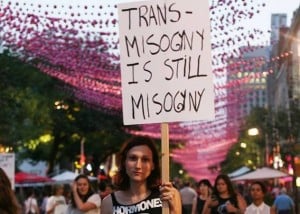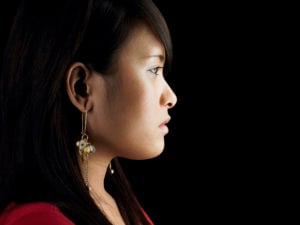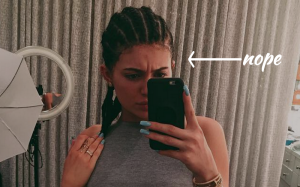So you see a woman that you’re attracted to and she happens to be Asian. Yet, somehow, whatever you’re saying just isn’t working.
There are some pretty creepy guides out there about how to flirt with ‘Asian women’ that tend to simultaneously exoticize and infantalize us as shy, family-oriented, and Hello Kitty-loving delicate flowers in need of manly protection.
Often, when non-Asian folks try to flirt with Asian women, it’s like they’re responding to a racist caricature of what they think we are or should be.
It’s not always that person’s fault…these caricatures and stereotypes are informed by a long history and tons of damaging media images.
Asia is a huge place that is geographically, culturally, ethnically, and religiously diverse, so ultimately it doesn’t make too much sense to treat‘Asian women’ as if we were one singular category.
There’s a big difference between approaching a woman because she is Asian versus approaching a woman who also happens to be Asian. The former treats someone like a curiosity and the latter allows for more consideration of someone’s individual humanity
I want to know that someone’s open to getting to know me, and not putting me in a box based on their perception of my race.
Hearing something like “I love Asian women” isn’t a compliment — how does that make someone feel special?
It’s okay to notice my race — I want you to. Your awareness that I am a woman of color is important!
However, I don’t want our interaction to be based around stereotypes of what someone associates with my racial identity.
There are two main things to consider when you’re flirting with a woman who also happens to be Asian: Don’t essentialize ‘Asian women’ as one category, and don’t make the encounter all about our “Asian-ness.”
All other best practices for non-creepy flirting and non-racist flirting with women of color also apply.
In an initial ‘getting-to-know-you’ encounter, there are several lines that are used over and over again on Asian women that are super frustrating. Here’s what not to do and some ideas of what to do instead:
1. Stop Guessing Our Ethnicity (Or Where We Are Really From)
“Are you from China?” “Let me guess. You’re Korean? Japanese?”
I list these three East Asian countries mainly because they’re the only countries that other people seem to know. I’ve had people rattle them off at me as if they’re going to win a spectacular prize for guessing right.
But what they don’t seem to understand is that underlying the seemingly innocent question is also a history of xenophobia and anti-Asian sentiment that includes exclusionary immigration policies and hate crimes.
Whiteness perceived is as “normal,” so because of our non-white appearance, many people think we have to be from some distant, faraway land.
“Where are you really from?” continues to reproduce the image of Asians as perpetual foreigners who don’t really belong.
When someone tries to guess or figure out our Asian American ethnicity or where we’re from, it implies that Asian Americans are only from one particular place — somewhere overseas — despite whatever connection someone might feel towards that place.
Asian American identity is questioned on a daily basis — both the ‘Asian’ and the ‘American’ aspects of identity. Often, Asian Americans do a lot of work negotiating between the two.
Not only is this guessing game not cute, it’s reminding someone that their identities and experiences are unexpected and abnormal.
People do not go up to a White person and start listing off countries at them. “You’re French aren’t you?” “No? Swedish? Scottish? Icelandic! Danish!”
It’s an explicitly racialized thing that happens to people of color that “look” foreign.
It’s also dehumanizing in the sense that these guessing games tell me that you’re not really thinking about me as a person — just an embodiment of a racial category.
Instead: Ask Where We Grew Up, And Let the Initial Answer Be Enough
“Where are you from?” is a standard question to ask someone you just met. But since that question is so loaded for Asian-Americans, it’s better to ask a more specific question of “where did you grow up?”
That way rather than probing inappropriately into our immigration history, you can just respond with “oh, you’re from Chicago? Cool!”
But going down the path of “no really, where are you actually from? Where are your parents from?” is not appropriate.
My ethnicity isn’t going to remain a mystery forever if we keep talking. Just, can it not be the first thing?
Besides there are ways to find points of connection with me without needing to pinpoint my racial and ethnic difference.
After learning where someone grew up, there are so many other directions to go! You can find out where else they’ve lived; if and where they’ve traveled; what’s their favorite (or least favorite) thing about their hometown, etc.
It’s a good jumping off point to begin learning about someone’s lived experiences.
2. Don’t Make Assumptions About Our Language
More specifically, this means no “Ni ha ma”-s, “Konichiwa”-s, “Namaste”-s, “Annyong haseyo”-s, etc.
I get it. You want to impress someone with your language skills, but not all people who “look” East Asian speak Chinese or who “look” South Asian speak Hindi. There are over a thousand languages spoken in Asia, so don’t presume what someone may or may not speak.
Also, please don’t ask the other person to say something in “their” language…it’s so awkward when people ask me to say a word in Chinese, as if I’m an exotic parrot.
There’s a false expectation that all Asian Americans are “exotic others” because there are still so few portrayals of Asian Americans in mainstream media and culture that there’s erasure of Asian American lived experiences and identities.
For example, many stereotypical representations depict Asian Americans as non-English speaking immigrants, which leaves no room for Asian Americans who don’t speak an Asian language fluently or who do speak English in an “North American” accent.
The global spread of English due to a variety of factors, namely colonialism and global capitalism, has also affected language capacities worldwide.
Consider this: do you know or know of someone whose gone somewhere in Asia to teach English? English is forcing its way to be a “normalized” language around the world.
For example, my cousins in Taiwan grow up learning to speak both Mandarin and English at school. Knowing both languages, specifically for people whose first language isn’t English, is an expectation now.
Instead: Say “Hi” In Whatever Language You Feel Most Comfortable
Rather than guessing what the other person knows, start with what you know.
As always, context matters. If we’re in the U.S., you can go ahead and assume that we speak English.
If you’re in an Asian country, yes, you can say hello or start up a conversation in the language that is primarily spoken there if you are fluent.
However, if ‘hello’ is the only word you know in that language, then it’s just silly to start out that way. What would you say next?
3. Stop Bringing Up Your Previous “Asian Girlfriends”
“My last girlfriend was Asian.” I’m never quite sure if what someone means is that because they’ve dated one or more other Asian people, that’s an impressive qualification for dating another.
What am I supposed to do with information like that?
Joy Regullano points out the ridiculous weirdness of this in her sketch where she inverts common sexist and racist statements used to pick up Asian women on White men: “I really like White guys. My last boyfriend was white, and the one before that, and the one before that.”
Your previous relationship(s) with other Asian women do not a) make you an expert on “Asian women” b) “qualify” you to date another.
I once dated a guy who kept telling me about his previous Chinese girlfriend. We’d go somewhere and he’d say something like, “oh, my Chinese girlfriend from high school took me to get dim sum too. It was an authentic place filled with lots of Chinese people who didn’t speak English.”
Great, I’m so glad you see your romantic partners as a cultural tour guide.
Instead: Discuss What You’re Looking for in a Future Relationship
Talking about people you’ve dated and partners you’ve had is a healthy part of relationships and learning from past relationship experiences is also important.
But, when it becomes specifically racialized, it then seems like you’re treating both previous and current partner as one person — like you’re trading in one “Asian woman” for another.
It can also evoke the discomfort of comparing and conflating people you’ve dated. Someone’s Asian-ness should never be indicative of whether or not they’re a good match.
Instead of bringing up previous partners right away, have a discussion about what you’re seeking in a potential partner or what you want out of a future relationship.
You can find out what values you and this new person have in common and also learn more about their personality.
4. Don’t Immediately Tell Us You Love ________ Food
“Ooh! You’re Japanese, I love sushi.” “You’re Vietnamese? Where can I go to find authentic pho?” “You’re Taiwanese…is that like Thai food?”
There’s something about being Asian where we seem to evoke food and desires of food. This happens so often.
The moment from when someone identifies me as Asian to the moment that they share a particular food item they enjoy is almost immediate.
The continent of Asia often becomes homogenized and reduced to menu options and ingredients, and for certain places, food is the only identifier.
I don’t go up to white people and say, “I love hamburgers!” without any conversational context.
It also doesn’t make sense because not all white people eat hamburgers nor are hamburgers the sole menu item that represent the many food traditions of people with European descent.
I get that someone’s just trying to show appreciation for “my” food culture or seeking a point of connection, but there’s a haunting connection between the exotification of Asian people and the exotification of our food cultures.
Instead: Find Other Ways to Connect Over Culture
While it’s exciting to discover shared interests with someone you’re talking to, the logic of “I associate your ethnicity with food I like to eat” is not the smoothest leap.
Everyone has a unique connection to their culture and the communities they’re from, which also shows up in a specific, individualized practices and interests.
For example, my family has food traditions that are unique to our family and not widely recognizable with other Taiwanese American families across the board.
It’s definitely possible to show interest in someone’s culture without immediately making leaps based on race and ethnicity.
Plus, there’s also no need to make assumptions of exotic cultural difference.
There are so many different ways to relate to someone and discover their interests. Conversations about favorite foods, like favorite movies, artists, shows, etc can easily come up in a more organic and genuine way that isn’t just a reaction to racial identity.
5. There’s No Need to Prove Your Cultural “Expertise”
Because we just talked about food, cultural “expertise” might show up like this: “I know how to use chopsticks!” “I’ve eaten chicken feet before.” “I backpacked through Thailand once.” “I can speak Japanese.”
I’m no expert on “my” culture, which is already a complex blend of many things, and I do love talking to people I learn new things from. However, these quips just seem out of context as an introduction.
Sometimes, people will try to prove that they “do Asian culture” better. Especially if you’re White, this interaction comes off as “whitesplaining.” It’s reminiscent of when Europeans went to “the East” and came back as experts and connoisseurs of “exotic” cultures.
It would be odd if I went up to a white person and opened with, “I’ve been to England before!” if I have no idea if they’ve travelled there or what their point of connection is to that place.
Instead: Share Knowledge Without Patronizing Us
There are ways to be respectful and knowledgeable of different cultures outside of your own without being patronizing about it and without bringing things up just as a response to someone’s racial identity.
If you’re someone who travels extensively, love reading about different places or trying new things, that’s awesome. Those are super interesting and great ways to find points of connection with another person.
Again, these things that should come out of conversation, rather than forcefully inserted.
6. So You’ve Never Dated an Asian Women or You Only Date Asian Women?
“I’ve always wanted to date an Asian!”
When someone says this, it’s like they’re collecting women. That’s creepy.
There’s also an implied set of expectations around what it might be like to date an Asian woman, that somehow this experience will be magically unique — not because it’s a different person, but specifically because this person is Asian.
Asian women are not your gateway or ticket to the “mystical Orient” — your imagination of wherever that place is doesn’t exist.
For folks who only date Asian women, fetishizing an entire group of people based on race alone is objectifying. It reduces people down to sexualized stereotypes. The exotification of Asian women project a fantasy around how Asian women behave and act.
If you’re fetishizing Asian women, you don’t really want to get to know us or care about us…you’re more interested in the idea of us.
For East Asian women, this includes the fantasy of adorable “kawaii” girls, submissive lotus flowers, or hypersexualized “geishas.” These stereotypes placed onto a population of over a billion people come from 200 years of geopolitical history.
The porn industry (and mainstream media) has continued creating the dangerous myth that Asian women are subservient enjoy being dominated.
That we’re here to take someone’s orders while giggling and wearing “schoolgirl” pigtails.
That we’re here to for the purposes of someone else’s pleasure.
But guess what. We’re not here just for you.
Instead: Take Some Time to Reflect
Yep, there’s some self work that’s needed here before you go and project all of that onto another person. Dig deep and think about why you’re actually interested in Asian women.
Chances are, you’ll find that what you find desirable is linked to inaccurate stereotypes that end up being a huge obstacle in actually getting to know someone.
Draw up a list of what you’re really looking for in a partner rather than trying to tie down certain traits to an entire racial group.
***
My race and ethnicity are important identities to me, and talking about those things are important to me, but they’re not the only things that make up who I am.
Assuming that racial identity specifically comes with certain cultural elements ends up creating a totalizing one-dimensional view of a person.
I happen to love my family and cute animal stationery but it’s not only because I’m Asian!
My life experiences have a lot to do with my Taiwanese ethnicity and being raised by immigrant parents, but they’re also informed by a lot of other things.
When you make essentializing assumptions about someone, you lose all the wonder of really getting to know a person and all their unique complexities and where’s the fun in that?
[do_widget id=’text-101′]
Rachel Kuo is a Contributing Writer for Everyday Feminism and a scholar and educator based in New York City. Her professional background is in designing curriculum and also communications strategy for social justice education initiatives. You can follow her on Twitter @rachelkuo.
Search our 3000+ articles!
Read our articles about:
Our online racial justice training
Used by hundreds of universities, non-profits, and businesses.
Click to learn more





















